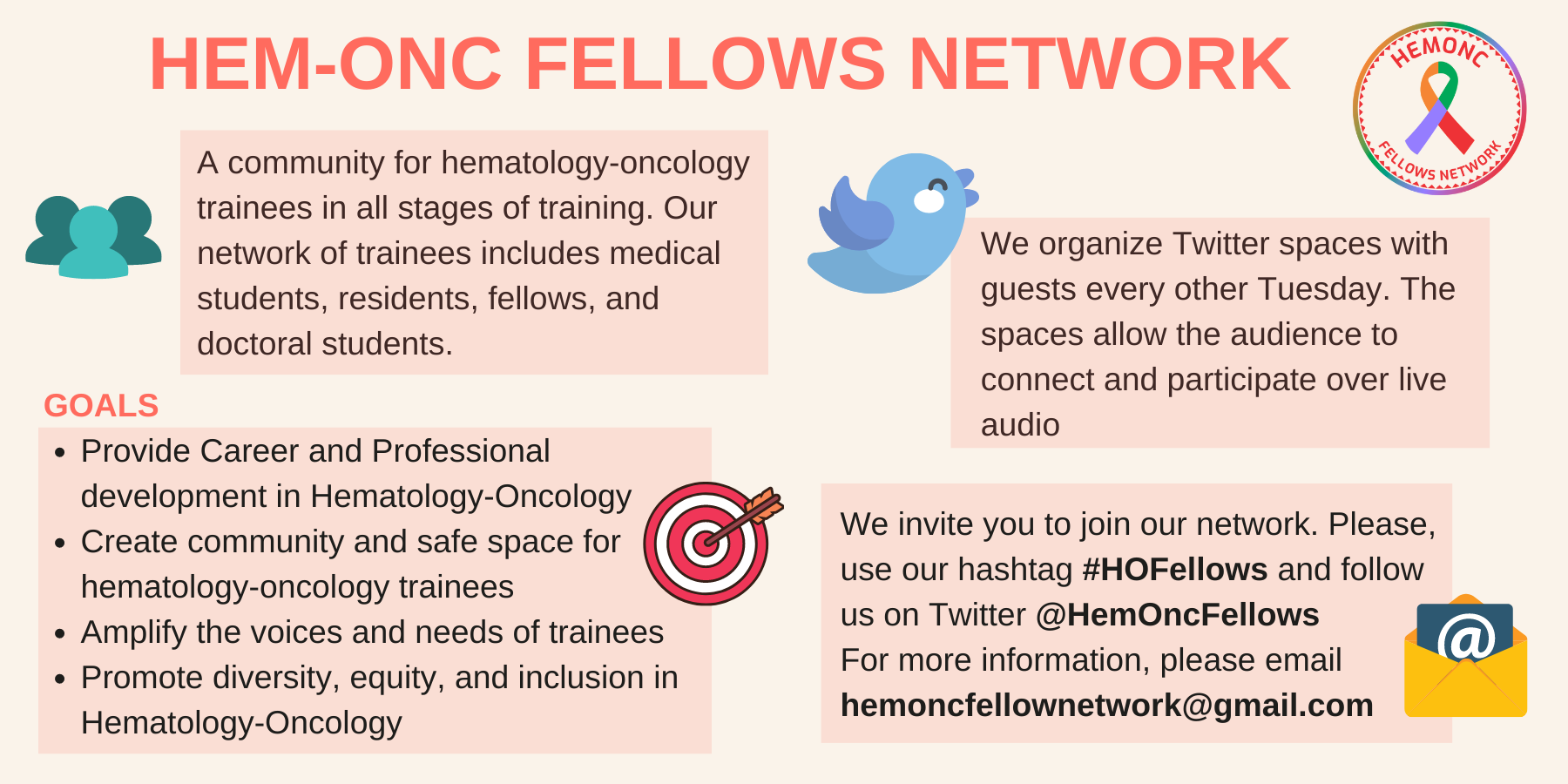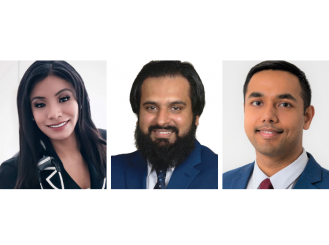By Andrea Anampa-Guzmán, Muhammad Salman Faisal, MBBS, and Aakash Desai, MD, MPH
The Hem-Onc Fellows Network (@HemOncFellows) is an online community for hematology-oncology trainees in all stages of training. Our network of trainees includes medical students, residents, fellows, and doctoral students. Our current core team includes the three authors of this piece and Ghulam Rehman Mohyuddin, MD (“Manni”). The Hem-Onc Fellows Network is committed to promoting diversity, equity, and inclusion in hematology-oncology. The goals of our network are:
- Provide career and professional development in hematology-oncology
- Create community and safe space for hematology-oncology trainees
- Amplify the voices and needs of trainees
- Promote diversity, equity, and inclusion in hematology-oncology
Our group was inspired by the Infectious Diseases Fellows Network (IDFN), a group of fellows passionate about infectious disease education. It was established in 2020 and started as a Twitter account and expanded into case conferences, board-style questions, and a curated evidence compendium. Their goal was to create content for fellows and by fellows. The IDFN has fellow leads and contributors with faculty review and oversight. OncoAlert is another excellent example of how social media has influenced the conversation within hematology and oncology. OncoAlert is a network of cancer care professionals (medical, radiation, and surgical oncologists, cancer scientists, oncology nurses, and patient advocates, among others) and a nonprofit that aims to fight cancer through social media together.
The Hem-Onc Fellows Network was created by Dr. Faisal in February 2021 to respond to the needs of trainees. Hematology/oncology is a highly demanding field, and hem/onc physicians are susceptible to burnout; around one in three hem/onc fellows report experiencing burnout.1,2 A sense of community can help in this very emotionally draining field.3 The network also helps trainees to stay updated with the changing treatment paradigm in hematology-oncology, along with tips and tricks to navigate the system.4 Finally, the network aims to amplify the fantastic work done by trainees.
The Hem-Onc Fellows Network hosts Twitter Spaces with guests every other Tuesday. Twitter Spaces allow live conversations on Twitter, and Live Spaces appear at the top of the timeline, making it easy for people to join. The spaces enable participants to connect in a new way, listening and joining the discussion over live audio. At the time of publication, our network has successfully hosted five Twitter Spaces with an average attendance of 38 people, on the topics of research in fellowships, fellowship match application, conferences for fellows, job search, and the transition from fellow to attending in service.
We plan to expand as a global network, but we are starting in the United States. We also plan to expand our topics from professional development to include educational seminars on tumor types. The network recognizes the importance of practical experience and tips for fellows of the first year. The network is open to collaboration with other educational initiatives in the field.
We invite all hematology/oncology trainees to join:
- Follow us on Twitter @HemOncFellows
- Use our hashtag #HOFellows
- Email hemoncfellownetwork@gmail.com for more information

Mrs. Anampa-Guzmán is a medical student at Universidad Nacional Mayor de San Marcos in Lima, Peru. She is a researcher at the lymphoma section of Roswell Park Comprehensive Cancer Center and serves in ASCO's Social Media Working Group. Follow her on Twitter and Instagram @andreaanampag. Disclosure.
Dr. Faisal is a hematology-oncology fellow at Roswell Park Comprehensive Cancer Center. Follow him on Twitter @msalmanfaisal. Disclosure.
Dr. Desai is a hematology-oncology fellow at Mayo Clinic, Rochester. He serves as a secretary for the Minnesota State Medical Association Resident and Fellow Section. He is one of the founding members of the grassroots consortium focusing on COVID19 in patients with cancer, now known as the COVID19 and Cancer Consortium (CCC19; @COVID19nCCC). Follow him on Twitter @ADesaiMD. Disclosure.
The views expressed here are the authors’ own.
References
- Schaufeli WB, Leiter MP, Maslach C. Burnout: 35 years of research and practice. Career Dev Int. 2009;14:204-20.
- Richardson DR, Tan X, Winzelberg G, et al. Development of an Art of Oncology Curriculum to Mitigate Burnout and Foster Solidarity Among Hematology/Oncology Fellows. JCO Oncol Pract. 2020;16:e384-94.
- Graff SL, Close J, Cole S, et al. Impact of Closed Facebook Group Participation on Female Hematology/Oncology Physicians. J Oncol Pract. 2018;14:e758-69.
- Shreenivas AV. Keeping Ahead of Oncology Advances Requires Vigilance. OncLive. Sep 11, 2018.



Recent posts